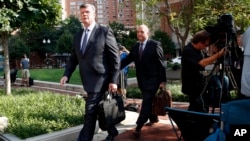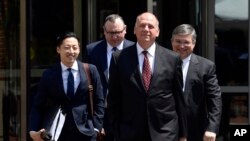Former Trump campaign chairman Paul Manafort's right-hand man testified at trial on Tuesday that Manafort instructed him not to tell their firm's bookkeeper about payments from accounts in Cyprus that held millions of dollars in earnings from consulting work for pro-Russian politicians in Ukraine.
Rick Gates, the U.S. government's star witness in Manafort's trial on tax fraud and bank fraud charges, told a federal court jury in Alexandria, Virginia, that there were hundreds of emails showing Manafort approved payments out of the Cypriot accounts.
Gates' testimony on the trial's sixth day was part of the prosecution's effort to prove that Manafort was responsible for financial maneuverings that he and other witnesses have testified include filing false tax returns and failing to report foreign bank accounts.
Gates, Manafort's long-time business partner, is expected to face a tough cross-examination later on Tuesday by defense lawyers in the first trial to arise from Special Counsel Robert Mueller's investigation into Russian interference in the 2016 U.S. election. The Kremlin denies election meddling.
While outside the scope of the trial, Mueller is also investigating whether Trump campaign members coordinated with Moscow, an allegation President Donald Trump denies.
Manafort's defense is seeking to pin the blame on Gates himself, who has acknowledged embezzling from Manafort's firm.
Manafort, 69, has pleaded not guilty to 18 counts of bank fraud, tax fraud and failing to disclose foreign bank accounts.
Gates, who also was an official on Trump's campaign, pleaded guilty in February to lying to investigators and conspiring to defraud the United States and agreed to cooperate.
On Tuesday, Gates also testified about "modified" invoices for payments to U.S. vendors that he said he created at Manafort's request. The invoices were created to meet document requirements of a bank, Gates said, adding that the payments were legitimate.
He testified about a complex scheme in which earnings from Manafort's political work in Ukraine would be paid by Ukrainian businessmen using companies in Cyprus to other Cyprus-based companies controlled by Manafort.
Prosecutors showed contracts laying out that Manafort would be paid $4 million a year in quarterly installments of $1 million, all channeled through Cyprus. The funds were logged as loans, but Gates testified they were in fact compensation to Manafort.
Money from the Ukraine work dried up after pro-Russian President Viktor Yanukovych was forced from power in 2014, Gates testified. A $1 million payment for work in 2014 was "significantly past due" and "Mr. Manafort was quite upset the money had not been sent," Gates told the court.
Manafort's Kiev-based aide Konstantin Kilimnik was able to collect $500,000, Gates said, but "to my knowledge it was never paid in full." Kilimnik was indicted in the Mueller investigation in June.
Gates, 46, testified on Monday that he helped falsify Manafort's tax returns and hide his foreign bank accounts. He testified that he has met with prosecutors about 20 times. It is unclear what other information he may have provided to Mueller's team.
Gates admitted on Monday that he did steal money through inflated expense reports, but he said it was hundreds of thousands of dollars, not millions as defense lawyers stated.
Manafort's lawyers are expected to use the theft to try to undermine Gates' credibility as a witness. They also are likely to bring up his making false statements to investigators.
One issue that could be a challenge for prosecutors on Tuesday is the extent to which they are allowed to admit evidence about Manafort's Ukraine work and the oligarchs who paid him. On Monday, U.S. District Judge T.S. Ellis repeatedly clashed with prosecutors about the relevance of such testimony and once again urged them to speed things along.






